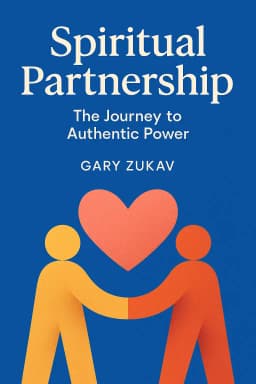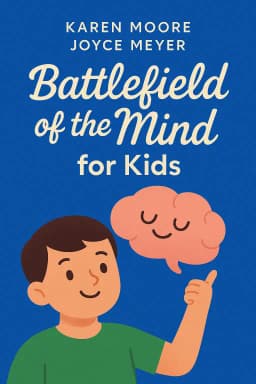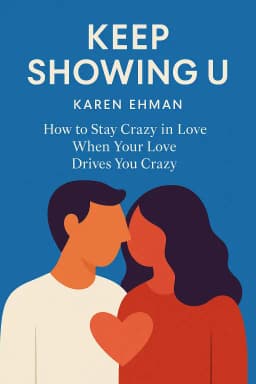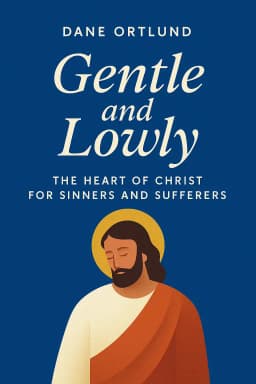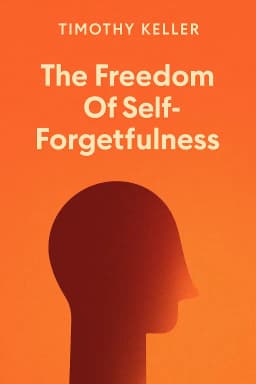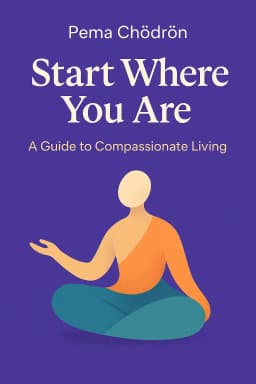
Your Mind is a Prison
A Meditator's Guidebook (Revised Edition)
Golden Hook & Introduction
SECTION
Daniel: Alright Sophia, five-word review for Journey of Awakening. Go. Sophia: Harvard professor quits, finds bliss. Daniel: Ooh, nice. Mine is: Your mind is a prison. Sophia: Well, that's a cheerful start. Let's unpack that. But first, what book are we even talking about? Daniel: We are diving into Journey of Awakening: A Meditator’s Guidebook by Ram Dass. And what's wild is that Ram Dass wasn't some lifelong monk. He was Richard Alpert, a prominent psychology professor at Harvard in the 1960s, surrounded by success, who realized it all felt hollow. That disconnect sent him on this incredible journey to India, and this book is the map he brought back. Sophia: I love that. A map from someone who started in a world we all recognize—academia, ambition, the whole nine yards. So, your ominous "mind is a prison" line... explain yourself.
The Success Trap & The Thought Prison
SECTION
Daniel: It’s the core premise of the book. Ram Dass starts with a feeling many of us know. He quotes, "When we make it in our society and then don’t feel good inside— happy, at peace with ourselves—we are confused." He’d achieved everything he was supposed to want, yet the happiness wasn't there. Sophia: But isn't that the whole point of the game? Climb the ladder, get the accolades, and then you're allowed to be happy. That’s the deal society makes with us. Daniel: Exactly. And he's saying the deal is a scam. The real problem isn't that we're failing at the game; it's that we're trapped inside the game. He calls it the "thought prison." Our ego, this collection of thoughts about who we are, what we like, what we fear—it builds the walls of our reality. We think we're looking at the world, but we're just looking out of the tiny windows of our cell. Sophia: That’s a heavy concept. Can you give me an example of what that looks like in real life? Daniel: He uses a great one: the character Archie Bunker from old-school TV. Archie has a label for everyone—black, white, liberal, conservative. As long as everyone fits into his neat little boxes, his world is stable. But the moment a black man is a corporation vice-president or his doctor is a woman, his world collapses. The reality doesn't fit his labels, and he panics. Sophia: Huh. So the ego is like a really bad algorithm, constantly feeding you the same content, the same conclusions, and you think that's the entire internet. You're stuck in a filter bubble of your own making. Daniel: A perfect modern analogy. And the fear of that bubble popping, the fear of losing our sense of identity, is what keeps us locked in. We'd rather be a king in a large, familiar cell than step outside into the unknown. The book argues that meditation is the key to unlocking the door. Sophia: Okay, I'm sold. I'm in a thought prison. How do I get out? The book seems to offer a million ways. It feels like a spiritual supermarket, and I have decision paralysis.
The Spiritual Supermarket: How to Pick a Path, Not a Product
SECTION
Daniel: That's the beauty of his approach. He acknowledges that spiritual supermarket. There's mantra, contemplation, visualization, devotion, even movement-based practices like T'ai Chi or Hatha Yoga. The book is highly-rated by readers precisely because it doesn't scream, "This is the ONE TRUE WAY!" Sophia: Which is refreshing. But it's also overwhelming. How do you even begin to choose? Do I just close my eyes and point? Daniel: Ram Dass has this wonderful, relaxed "suck-it-and-see" ethos. He says to start with what you're already good at or what excites you. If you're intellectual, maybe start with contemplation—reading spiritual texts. If you're heart-centered, try devotional practices. If you're active, try a movement meditation. The point isn't to find the perfect method forever, but to find a method that gets you started. Sophia: So it’s less about the brand and more about what fits your personal taste. Daniel: Exactly. And it’s about understanding the underlying principle, which is non-attachment. There's a beautiful little story in the book about a king who is deeply troubled by the ups and downs of life. He challenges his wise men to create something that will make him happy when he's sad, and sad when he's happy. Sophia: That’s a heck of a design challenge. What did they come up with? Daniel: They gave him a simple ring. Inscribed on it were four words: "This too shall pass." When he was ecstatic, he'd look at it and be reminded of impermanence. When he was in despair, he'd look at it and find hope. It’s a tool for perspective, for not clinging to any single state. Sophia: I love that. It’s so simple. But for someone starting out, even choosing a mantra feels like a huge commitment. What’s the first practical step? Daniel: The book suggests a "trial run." Pick one method, any method, and commit to it for a set period—maybe two weeks, maybe a month. And during that time, you suspend all judgment. You don't ask, "Is this working?" You don't criticize it. You just do it. After the trial period, you can assess. It’s about giving a practice a fair shot to reveal itself to you. Sophia: That’s actually very freeing. It lowers the stakes. You’re not marrying the practice, you’re just taking it out for coffee. Daniel: Precisely. But the book's real genius, for me, is that it doesn't just tell you how to start. It warns you about the traps you'll hit once you feel like you're succeeding.
The Enlightened Ego: Navigating the Hidden Traps of the Spiritual Journey
SECTION
Sophia: Traps? I thought the whole point was to get to a place of peace and safety. Daniel: That's what we think. But Ram Dass points out that the ego is incredibly clever. If it can't keep you in the old prison, it will build you a new, fancier one with spiritual-looking wallpaper. He calls it "spiritual materialism"—turning the journey into another form of acquisition. Sophia: What does that look like? Collecting crystals and yoga pants? Daniel: It can, but it's much deeper than that. It's about becoming attached to the experiences of meditation. You have a blissful moment of peace, and suddenly your ego latches on. It says, "That was it! I'm enlightened! Or, how do I get that back?" You start chasing the spiritual high. Sophia: Oh, I can see that happening. You finally get a good result and you want to replicate it, just like in any other area of life. Daniel: And that's the trap. The book tells this incredible story about a milk seller in Brindavana, a holy town in India. Because of his pure heart, the gods Krishna and Radha appear to him in a vision of light. It's this profound, ecstatic experience. Sophia: Wow. So he became a great saint? Daniel: No. He just stopped selling milk. He was so overwhelmed by the memory of the ecstasy that he could talk about nothing else. He spent the rest of his life clinging to that one peak experience. He got stuck on the view from the mountaintop and never came back down to live. Sophia: Wow. So the goal isn't to have these amazing, blissful experiences? That's completely counter-intuitive. We're trained to chase the peak experience in everything we do. Daniel: And that's the radical insight. The book argues that any experience you can name—bliss, peace, a vision—is still just another thought form, another cloud passing in the sky of awareness. Clinging to it is just another cell in the prison, even if it's a very comfortable one. This is where some critics find the book's Hindu-influenced philosophy a bit challenging, this idea of a pure, observing self separate from all experience. But the practical wisdom is undeniable. Sophia: It’s a total reframe. The journey isn't about what you gain, but about what you're willing to let go of, including the good stuff. Daniel: Exactly. The journey isn't about collecting spiritual souvenirs. It's about fundamentally changing the perceiver, not just the perceptions. It's about being free in the world, not from it. There's a great quote from the Christian mystic Brother Lawrence, who said he could possess God in as great a tranquility in the noise and clatter of his kitchen as he could on his knees in church.
Synthesis & Takeaways
SECTION
Sophia: That’s the real goal then. Not to escape the kitchen, but to be at peace while the pots and pans are clattering all around you. So, after all this—the prison, the supermarket, the traps—what's the one simple thing a listener can take away from this book today? Daniel: It’s beautifully simple. Just for today, try to notice one thought as if it were a cloud passing in the sky. You don't have to change it, judge it, or do anything about it. Just notice it. "Ah, a thought about my to-do list." And then let it drift by. That's it. That's the beginning of freedom. Sophia: I love that. It’s not intimidating at all. And if you try it, let us know how it feels. We're always curious to hear your experiences. You can find us on our socials. Daniel: It’s an open invitation to the feast. Sophia: A perfect way to put it. Daniel: This is Aibrary, signing off.
